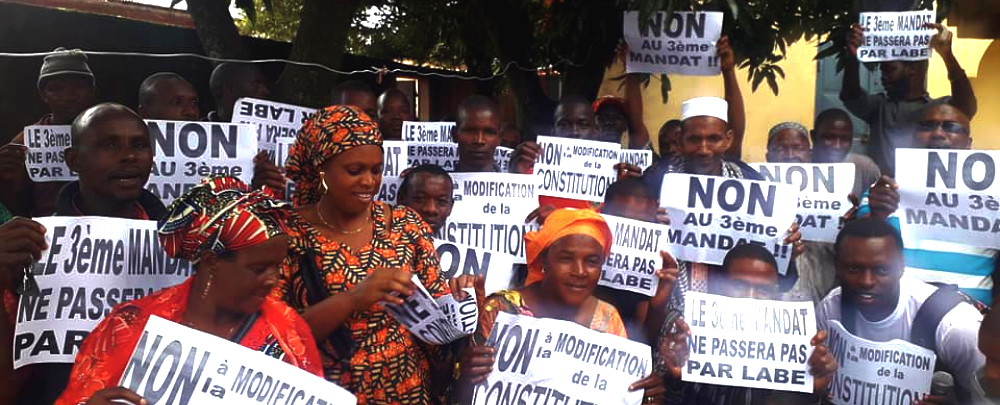
Guineans protesting the possibility of a third term for Alpha Condé. (Photo: FNDC/Labé)
Ignoring massive protests, admonitions from ECOWAS leaders, and international criticism, President Alpha Condé pushed through a constitutional referendum in Guinea on March 22. The referendum along with legislative elections were boycotted by opponents on the grounds that it was illegitimate, having been authorized only by the President of the National Assembly, a Condé ally, and not the Parliament, as stipulated by the Constitution. At least 32 protesters were killed by police in the run-up to the polls. Deeming that the electoral process, including a disputed voter registry, fell below the standards for a credible vote, international electoral observers did not participate.
At the heart of the controversy is 82-year-old Condé’s quest to undo term limits that would have him step down from the presidency in October, after 10 years in office, enabling Guinea’s first-ever democratic succession. Under the new Constitution, Condé would be eligible to stay in office for 12 more years. Having endured 50 years of authoritarian rule and abuses of power before beginning its democratic transition in 2010, the issue of presidential term limits is especially charged for many Guineans. The legacy of this long period of misgovernance has left Guinea one of the poorest countries in Africa.
The moment is pivotal for Guinea given that the track record of African leaders who have stayed in power beyond 10 years is marred by growing repression, corruption, financial instability, underdevelopment, and conflict. Condé’s rule has been marked by growing authoritarianism, including the replacement of the head of the Independent National Electoral Commission (the Commission électorale nationale independante, CENI), the removal of the head of the Constitutional Court and forced ouster of the Minister of Justice who opposed the constitutional changes, shutting down of media outlets, and arrests of opposition leaders.
“Guinea’s slide back toward authoritarian rule portends greater political instability and economic turmoil.”
The evasion of term limits and democratic backsliding in Guinea represents a challenge to the Economic Commission of West African States’ (ECOWAS) hard-fought efforts to establish norms of checks and balances and democratic accountability. It also follows a recent pattern of flouting these norms elsewhere in the 15-member bloc. A legal case brought by an opposition coalition contending that the Condé government has violated its citizens’ human rights, as well as the African Charter on Democracy, Elections, and Governance, is currently before the ECOWAS Court of Justice.
Guinea’s slide back toward authoritarian rule portends greater political instability and economic turmoil for the mineral-rich but impoverished country of 12 million. This, in turn, has foreboding implications for Guinea’s neighbors who will be directly affected by the instability.
A Process Lacking Credibility and Inclusiveness
Guinean civil society organizations reported that many citizens heeded the opposition’s boycott of the referendum, with participation reaching only 30 percent in many parts of the country and less than 15 percent in the capital, Conakry. Past national votes in Guinea had seen participation levels of 75 percent. On the day of the referendum, local media outlets and social media reported that there were not enough “No” ballots at some stations. Others saw their voter cards confiscated and told to wait outside while someone voted for them. Still others said they were forced to vote “Yes.” At least 12 people were killed, with dozens more, including opposition leaders, arrested. In the Forestière region, a voting conflict sparked sectarian violence that led to several churches and mosques being burned and more than 15 people killed. In addition, security forces reportedly confiscated ballot boxes to conduct the counting themselves. Officially, the government claimed the referendum passed with 89 percent of the vote and 58 percent participation.
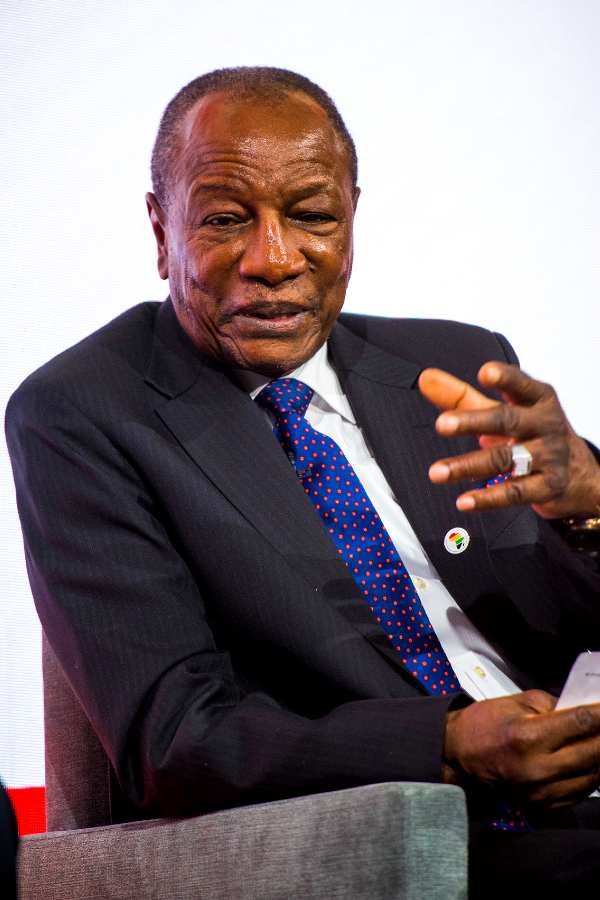
Alpha Condé. (Photo: UK DFID)
Prior to the vote, the Organisation internationale de la Francophonie (OIF) and ECOWAS found that there were more than 2.5 million “ghost” voters on the rolls. When Condé agreed only to a symbolic 2-week delay to correct the problem, international observers, including ECOWAS, the AU, and the EU, refused to take part.
The irregularities of the voting process were part of a sequence of actions leading up to the referendum that lacked credibility and popular support. Condé had worked for years to reshape the institutions charged with organizing and certifying the vote, notably CENI and the Constitutional Court. In the run-up to the referendum, three of Condé’s own ministers—Minister of Justice Cheik Sako, Minister of Higher Education and Scientific Research Abdoulaye Yero Baldé, and Minister of Citizenship Gassama Diaby—resigned in protest over his plans to adopt a new Constitution.
Following the referendum, key international stakeholders, including ECOWAS, the UN Office in West Africa and the Sahel (UNOWAS), the United States, France, and the European Union, all expressed serious concerns over the process’ credibility and inclusiveness. In contrast, some countries lacking democratic traditions such as China, Russia, and Turkey, were quick to congratulate Condé.
The New Constitution as a Means to Consolidate Power
The new Constitution, which went into effect on April 7, contains several provisions that weaken democratic checks and balances in Guinea. First, it increases the length of presidential terms from 5 years to 6 and resets the term-limit clock, clearing the path for Condé to seek a third term.
The new Constitution … contains several provisions that weaken democratic checks and balances in Guinea.
Second, it changes the structure of the Constitutional Court, allowing the President to increase his control over this crucial institution. Notably, the number of judges the President appoints increases from one to three (out of a total of nine). In addition, the responsibility to name the Court’s President no longer sits with its members but with the Head of State. Since the President of the National Assembly (an ally of Condé) also now names two judges, Condé can effectively choose up to five of nine judges on the court.
The new Constitution further removes key accountability provisions. Some of these measures had stipulated that corruption, economic crimes, and human rights violations would be exempt from the statute of limitations. This meant that while presidents enjoyed immunity during their mandates, they could be prosecuted for these abuses of power after their terms ended. This provision has now been eliminated. Similarly, a clause guaranteeing citizens a right to recourse through the courts for human rights violations committed by the government was also excised. In essence, the new Constitution widens the scope for impunity.
It also expands executive power vis-à-vis the legislature. In particular, all new laws need to be endorsed by the President, in effect giving him veto power over legislation. The only alternative would be for the President of the National Assembly to petition the Constitutional Court to have a piece of legislation promulgated absent the President’s endorsement. This option is unlikely to have much practical effect, however. Since Condé’s RPG party holds 79 out of 116 seats in Parliament following the boycotted elections held alongside the referendum, it’s unlikely that legislation Condé opposes will move forward, subverting the independence of the legislature. The new Constitution also removes provisions that prevented the President from dissolving Parliament more than once during his mandate or after its third year. In addition, it eliminates another provision that would force the President to resign in the event that, after Parliament was dissolved as a result of a disagreement on an issue, his party failed to gain a majority in new elections.
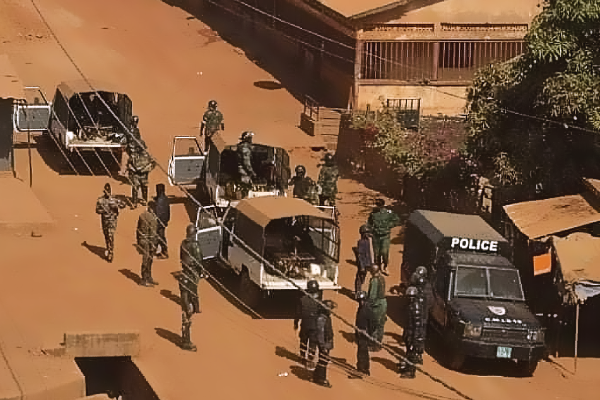
Guinean security forces deployed during the March 22, 2020, vote. (Photo: FNDC/Labé)
Significantly, the new Constitution eliminates Title XV, articles 141-145 of the 2010 Constitution on the purpose and role of the security sector. In addition to prohibiting private militias, those articles stipulated that:
“The defense and security forces are republican. They serve the nation. They are apolitical and under civilian control. No one can use them for their own purposes. Defense forces are tasked with national defense. Security forces are tasked with civil protection, public order and security, and the security of people and their belongings.”
The removal of this language is highly problematic given Guinea’s long legacy of politicized and unaccountable security actors. This pattern has continued under Condé who has been using security forces as an instrument to quash dissent. The elimination of these accountability provisions means it is even less likely that the long-delayed trial of the forces responsible for the 2009 stadium massacre will proceed. This incident, in which more than 150 protesters were killed and scores of women and girls raped, remains a highly emotional and symbolic case of impunity in Guinea. This will likely set back efforts to advance security sector reform and further deepen Guineans’ low levels of trust of security actors, which polls show reach just 41 percent for the police and 52 percent for the armed forces. The removal of this accountability provision, moreover, secures loyalty of security actors to Condé, rather than to citizens or the state.
A Resilient Opposition and Civil Society
Resetting the term-limit clock and increasing the power of the presidency goes against the wishes of the Guinean population, 82 percent of whom told Afrobarometer that they favor a two-term limit. Guinean civil society and the political opposition have shown enormous resilience and leadership in working to prevent Condé from implementing his plans, despite the country’s short democratic legacy. The opposition began organizing public, peaceful protests in March 2018, when Condé first tried to replace then President of the Constitutional Court Kéléfa Sall, who had publicly warned Condé against modifying the Constitution. But security forces repeatedly responded with deadly violence—human rights groups estimate that more than 100 people have been killed since the protests began.
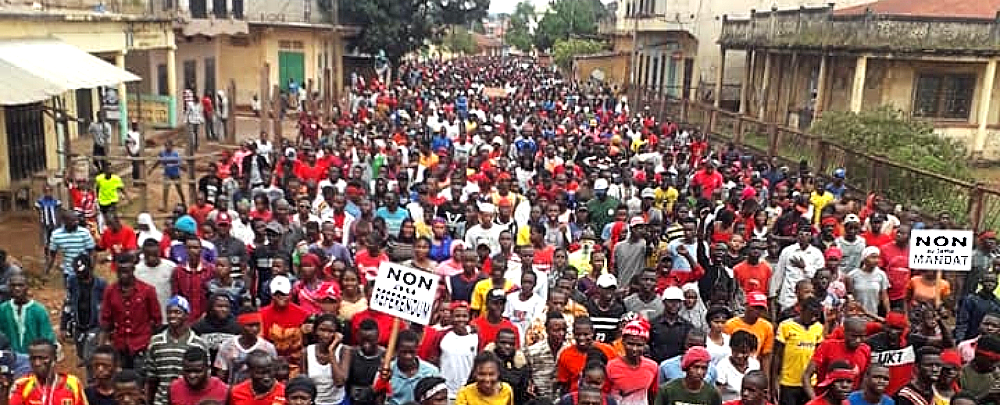
An October 2019 protest against changing the Guinean Constitution to allow Alpha Condé a third term. (Photo: FNDC/Labé)
The Front national pour la défense de la Constitution (National Front for the Defense of the Constitution, FNDC), a coalition of opposition political parties and civil society organizations, has worked to oppose Condé’s plans, despite its leaders being prevented from attending protests by security forces surrounding their homes, as well as being arbitrarily detained. The press has also shown resilience, despite outlets being suspended and banned and journalists arrested.
In the run-up to the referendum, the FNDC petitioned the ECOWAS Court, seeking legal recourse. In its suit, the FNDC argued that changing the Constitution would violate the African Charter on Democracy, Elections and Governance, as well as the ECOWAS Protocol on Democracy and Governance. It also contended that the Guinean government has violated its citizens’ human rights in violently suppressing protests, another violation of the AU and ECOWAS Charters. The case is pending before the ECOWAS Court.
A Way Forward
Condé, Guinea’s first democratically elected leader, appears to be intent on staying in office past his second term while governing in an increasingly authoritarian manner. These actions have disappointed citizens who had hoped the country would move away from its authoritarian past.
“Through the disputed adoption of a new Constitution, Condé has succeeded in weakening democratic checks and balances in Guinea.”
Through the disputed adoption of a new Constitution, Condé has succeeded in weakening democratic checks and balances in Guinea. Yet, the history of democratic transitions is marked by a pattern of progress, followed by setbacks, then a resumption of forward progress. Guineans’ aspirations for democracy, therefore, is not misplaced. Key to further progress, however, will be the resiliency of Guinean reformers and support from regional and international actors.
Guinean citizens have demonstrated a sustained commitment to democratic values by pursuing peaceful, legal means to protect their democratic rights. This commitment traces directly back to opposition to the rule of coup leader Moussa Dadis Camara and the stadium massacre of 2009. An important priority moving forward, therefore, will be to safeguard the space for civil society and democratic reformers to continue their demands for change—and persevere in establishing a mechanism for domestic political dialogue. In particular, this means the release of all political opponents who have been jailed for opposing the government or organizing the protests.
Reform of the Guinean security sector must be another priority. Using the security sector to advance political interests undermines the process of political dialogue. Adherence to the rule of law and respect for human rights, moreover, are central to stability and economic development. Instead, human rights groups say that abuses perpetrated by both military and police against opposition leaders and protesters continue. Consequently, regional and international partners should heighten efforts to engage Guinea’s security institutions to raise their understanding of the norms of military professionalism in the region, as well as the security sector’s role in advancing citizen security.
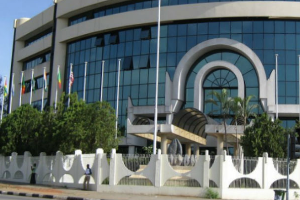
ECOWAS headquarters in Abuja, Nigeria.
ECOWAS has a critical role to play in keeping Guinea on a democratic path and institutionalizing the process of political succession for stability in the region. ECOWAS’ 2001 Protocol on Democracy and Good Governance lays out options the regional body can take when a member state violates essential elements of democratic governance. It could begin by organizing high-level talks with Condé to persuade him to step down as part of a dignified transition. A delegation of heads of state had planned to visit before the referendum, but the initiative was cancelled at the last minute when Condé said he would refuse to receive them. Absent an effort by Guinea to engage the regional bloc in good faith, ECOWAS could impose a travel ban and freeze the assets of Guinean officials, withdraw voting privileges, or temporarily suspend Guinea from the regional body. ECOWAS has done so in previous crises such as those in The Gambia, Burkina Faso, and Côte d’Ivoire. The examples of President Mahamadou Issoufou in Niger and President Alassane Ouattara in Côte d’Ivoire, both of whom will be stepping down at the conclusion of their second terms later this year, provide ECOWAS further leverage on this issue.
International democratic actors must also work together to support domestic dialogue and ECOWAS’ diplomatic efforts to facilitate a smooth transition and the upholding of democratic norms in Guinea. This may entail diplomatic engagement, the withholding of financial assistance, and targeted sanctions. Both bilateral and multilateral bodies committed to the advancement of democracy, such as OIF and the Community of Democracies, should also consider suspending Guinea’s membership in their organizations and not recognizing the validity of the referendum or legislative elections.
The legacy of unchecked presidential power in Guinea is hard to break. The country is now at a crossroads with competing visions for the future. By orchestrating the adoption of a new Constitution, Condé evidently wishes to consolidate power within the office of the presidency. Citizens aspire for a democratic government with shared powers. The resiliency of domestic reformers and the support they receive from regional and international actors will be influential in determining which vision takes hold.
Additional Resources
- Africa Center for Strategic Studies, “ECOWAS Risks Its Hard-Won Reputation,” Spotlight, March 6, 2020.
- Alix Boucher, “Guinea at a Crossroads,” Spotlight, Africa Center for Strategic Studies, August 15, 2019.
- Africa Center for Strategic Studies, “Term Limits for African Leaders Linked to Stability,” Infographic, February 23, 2018.
- Paul Nantulya, “Different Recipes, One Dish: Evading Term Limits in Africa,” Spotlight, Africa Center for Strategic Studies, July 28, 2016.
- Emile Ouédraogo, “Advancing Military Professionalism in Africa,” Africa Center Research Paper No. 6, Africa Center for Strategic Studies, July 2014.
- Joseph Siegle, “Overcoming Dilemmas of Democratisation: Protecting Civil Liberties and the Right to Democracy,” Nordic Journal of International Law, 81, 2012.
More on: Guinea

